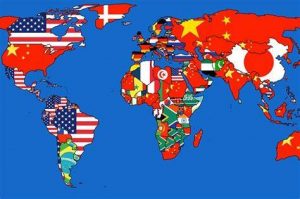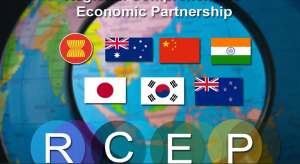China has embarked on a development path in line with national conditions

Over the past 70 years, the Chinese people have inherited the history and culture of the Chinese nation for more than 5,000 years. Based on the lessons learned from the past 500 years of socialism and more than 170 years of the Chinese nation ’s decline from prosperity in recent times, they have been in the great practice of the Chinese revolution, construction and reform , Successfully opened the road to socialism with Chinese characteristics, and achieved world-renowned development achievements.
Economic strength has increased significantly. The GDP has increased from 67.9 billion yuan to 90 trillion yuan, an increase of 174 times, with an average annual growth rate of 8.1%; the per capita GDP has increased from 119 yuan to 64,644 yuan in 2018, a 70-fold increase.
China has become the world’s second largest economy, the largest country in manufacturing, the largest country in trade in goods, the second largest country in commodity consumption, the second largest country in which foreign capital flows in, and the largest country in foreign exchange reserves.
People’s lives have improved greatly. China’s rural poor has fallen from 770 million in 1978 to 16.6 million in 2018. The incidence of rural poverty has dropped from 97.5% to 1.7%, creating a miracle in the history of human poverty reduction. China’s average life expectancy reached 77 years in 2018, much higher than the world’s average life expectancy of 72 years.
‘Please come in’ on a large scale. From 2001 to 2018, China’s imports of goods trade increased from US $ 243.6 billion to US $ 21358 billion, an average annual growth rate of 13.6%, 6.8 percentage points higher than the global average.
Striding ‘going out.’In 2018, China’s foreign direct investment was US $ 143.04 billion, 53 times that of 2002, with an average annual growth rate of 28.2%. In recent years, China has continuously maintained the status of the world’s largest source country of outbound tourists. In 2018, nearly 150 million outbound Chinese citizens traveled.
China maintains world peace with practical actions. China has become the second largest peacekeeping budget contributor and regular budget contributor of the United Nations, and the largest contingent member of the Security Council.
The destiny is determined by the road, and the choice of the development path is crucial to the success or failure of a country. The modernization of a large country with a population of nearly 1.4 billion has no precedent in human history.
Over the past 70 years, China has achieved great success in its development. The fundamental reason is to find the correct path for the development of socialism with Chinese characteristics and to continue unswervingly along this path.
Over the past 70 years, China’s development has been successful because of the leadership of the Communist Party of China.
China’s development is an opportunity for the world
As China ’s overall national strength and international influence increase rapidly, some people in the world are worried that China will follow the path of ‘domestic power must be hegemonic,’ and some have proposed the so-called’China threat theory’.
This is not only a cognitive misunderstanding, a deep-rooted prejudice, a psychological imbalance caused by the growth and decline of power, but also a deliberate misrepresentation in order to safeguard its own vested interests. China’s development is an opportunity to the world, not a threat or challenge.
China is the main stabilizer and source of power for world economic growth. In 2008, the world suffered a severe financial crisis, and the world economy was hit hard. China adopted a series of effective measures to successfully cope with the crisis. The economy recovered rapidly and became a good source of stability and power for world economic growth.
China is the largest contributor to world economic growth. In the past three years, China’s total economic volume has continuously crossed the 700, 800, and 90 trillion yuan mark, accounting for nearly 16% of the world economy. From 2013 to 2018, China’s average contribution rate to world economic growth exceeded 28.1%.
All-round opening to the outside world creates more opportunities for countries to share the ‘China Dividend’. China has the world’s most potential consumer market. China is both a ‘world factory’ and a ‘global market.’
China is the most attractive investment destination. China has nearly 900 million labor resources, more than 700 million employees, 170 million high-quality talents with higher education and vocational education, and more than 8 million university graduates each year. The talent bonus is huge.
Larger ‘going out’ benefits more countries. Chinese companies in Ethiopia build construction sites and factories, with local employees employing more than 90% of them. Chinese companies have created a lot of job opportunities for Africa. China actively promotes scientific and technological innovation to the world, so that technological development and innovation not only benefit China but also benefit the world, so that more people can enjoy the convenience and benefits brought by the development of science and technology.
It is true that a country has become a hegemonist because of its strength, but it is not a law of history that a country is strong. Judging China with the development experience of some western countries, and applying the development logic of some western countries to China, the conclusions drawn must be ridiculous and distorted.
China’s path of peaceful development is not diplomatic rhetoric, not an expedient measure, or strategic ambiguity. No matter how the international situation changes and how it develops, China will never seek hegemony, never expand, and never seek sphere of influence.
China’s path of peaceful development stems from the profound heritage of Chinese civilization. Chinese civilization originated inland and farming, and is a civilized and defensive civilization. There is no gene in the blood of the Chinese nation to invade others and dominate the world.
Building a prosperous and beautiful world is the common dream of all peoples
Since the 21st century, the deep-seated contradictions of global development have become increasingly prominent, the balance of international forces has become increasingly balanced, the international order and the global governance system have undergone deeper changes, and the world has entered a new period of major development, major changes, and major adjustments.
The big change has created new opportunities. The biggest change that has not happened in a century is the collective rise of emerging market countries and developing countries represented by China, which fundamentally changed the international balance of power.
The latest data from the International Monetary Fund show that the total economic volume of emerging market and developing countries has surpassed that of developed countries in 2008, and will account for 59% of the world economy by 2018.
The big changes are full of risks and challenges. Global economic growth lacks momentum and growth slows down. The excessive profit-seeking of capital has led to a continuous increase in the division of the rich and the poor, trade protectionism has intensified, and the downward pressure on the global economy has increased.
The governance of some Western countries is in trouble, populism is flooding, and anti-globalization is intensifying. Hot issues in some regions have continued to intensify contradictions, confrontations have escalated, and the ghosts of war are looming.
What’s wrong with the world? What about humans?
Faced with the unprecedented changes in a century, and the current governance difficulties and development difficulties, human society urgently needs to establish a new development concept and build a more just and reasonable international system and international order.
China proposes to build a community of shared destiny for mankind, with a view to solving the real problems facing the world today, and achieving the peaceful and sustainable development of human society. With the goal of universal harmony, we abandon the law of the jungle, do not engage in monopoly of power, and surpass the zero-sum game. s Choice.
To build a new type of international relations, we should respect each other, that is, insist that nations be equal regardless of size, strength, and wealth. Countries should respect each other’s political system, respect each other’s right to choose their own development path, respect each other’s interests and concerns, and oppose interference in other countries. Politics, opposing power politics and bullying.
A big country is an important force for maintaining world peace and stability, and a key factor in building a new type of international relations. A great power must look like a great power, and a great power must have the responsibility of a great power. The greatness of a great country lies not in its large size, large size, or large fists, but in large minds, large structures, and great responsibilities.
The great powers must take the future and destiny of mankind as their primary responsibility and assume greater responsibility for world peace and development, rather than relying on their strength to seek a monopoly on regional and international affairs. In the course of human society’s development, a successful strategy of a great power is bound to conform to the trend of the times and the trend of world development, and can be recognized by other countries and people.
Big nations must treat small nations on an equal footing. No country can wage war arbitrarily, cannot undermine the international rule of law, and cannot open the Pandora’s box. Contradictions and problems that arise must be resolved through equal consultations, with the utmost sincerity and patience, and through dialogue.
Economic globalization is an inevitable trend in the development of the world economy. However, the current economic globalization model is difficult to reflect the voices of the majority of developing countries and reflect the interests of the majority of developing countries. The jungle law of ‘weak meat and strong food’ and ‘You lose me win’ The zero-sum game of ‘eating’ causes the rich to become richer and the poor to become poorer. The gap between rich and poor in developed and developing countries and in developed countries is widening;
Individual countries blame internal governance issues on economic globalization and other countries, and they frequently adopt unilateralism, protectionism, and bullying to disrupt global value chains, supply chains, and consumption chains, leading to disorder and even conflict in the existing international trade order. To make the global economy fall into a ‘recession trap.’
It is not terrible for some problems in economic globalization to occur. We must not ‘retreat’, ‘decouple’, or ‘build a wall’ because of wasteful food. There is only a way out for reform and improvement. The problem must be solved in the course of progress.
China contributes to building a better world
As the world ’s largest developing country, China is unswervingly taking its own course, concentrating its efforts on its own affairs, making the country richer and stronger, and people happier, and injecting stability and certainty into a complex and changing world. It is itself the greatest contribution to world peace and development.
Some countries are getting richer and others are getting poorer. The world cannot be peaceful and lastingly prosperous. The Chinese people hope not only for a good life themselves, but also for the people of other countries.
Eradicating poverty is still the biggest global challenge facing the world today. China advocates accelerating the global poverty reduction process. Developed countries must increase their development assistance to developing countries, and developing countries must increase their endogenous development momentum.
China always pays attention to and helps the people of the countries living in hunger and poverty, and through efforts such as foreign aid, debt relief, increased imports, and expanded investment, it is working hard to help developing countries, especially the least developed countries, strengthen their own development capabilities.
